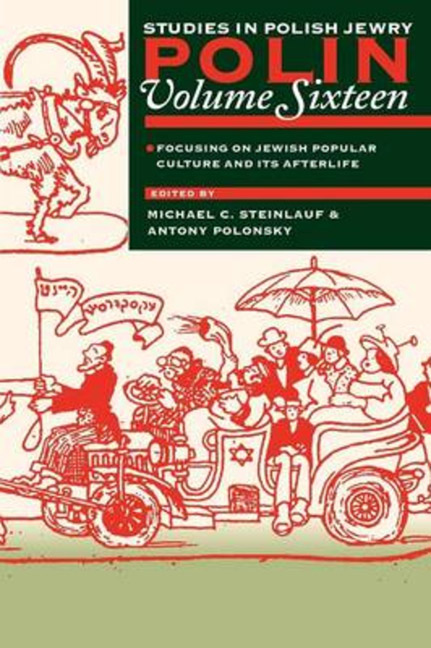Book contents
- Frontmatter
- Dedication
- Editors and Advisers
- Preface
- Polin
- Polin: Studies in Polish Jewry
- Contents
- Note on Place Names
- Note on Transliteration
- PART I JEWISH POPULAR CULTURE IN POLAND AND ITS AFTERLIFE
- IN PRE-WAR POLAND
- AFTERLIFE
- From ‘Madagaskar’ to Sachsenhausen: Singing about ‘Race’ in a Nazi Camp
- The Badkhn in Contemporary Hasidic Society: Social, Historical, and Musical Observations
- Transmigrations: Wolf Krakowski's Yiddish Worldbeat in its Socio-Musical Context
- ‘The Time of Vishniac’: Photographs of Pre-War East European Jewry in Post-War Contexts
- Repopulating Jewish Poland—in Wood
- The Kraków Jewish Culture Festival
- PART II DOCUMENTS
- PART III NEW VIEWS
- PART IV REVIEWS
- REVIEW ESSAYS
- BOOK REVIEWS
- CORRESPONDENCE
- OBITUARIES
- Notes on the Contributors
- Glossary
- Index
The Kraków Jewish Culture Festival
from AFTERLIFE
- Frontmatter
- Dedication
- Editors and Advisers
- Preface
- Polin
- Polin: Studies in Polish Jewry
- Contents
- Note on Place Names
- Note on Transliteration
- PART I JEWISH POPULAR CULTURE IN POLAND AND ITS AFTERLIFE
- IN PRE-WAR POLAND
- AFTERLIFE
- From ‘Madagaskar’ to Sachsenhausen: Singing about ‘Race’ in a Nazi Camp
- The Badkhn in Contemporary Hasidic Society: Social, Historical, and Musical Observations
- Transmigrations: Wolf Krakowski's Yiddish Worldbeat in its Socio-Musical Context
- ‘The Time of Vishniac’: Photographs of Pre-War East European Jewry in Post-War Contexts
- Repopulating Jewish Poland—in Wood
- The Kraków Jewish Culture Festival
- PART II DOCUMENTS
- PART III NEW VIEWS
- PART IV REVIEWS
- REVIEW ESSAYS
- BOOK REVIEWS
- CORRESPONDENCE
- OBITUARIES
- Notes on the Contributors
- Glossary
- Index
Summary
TWO weeks to the day before the cathartic ceremony on 10 July 2001 that marked the 1941 massacre of Jews in the north-eastern Polish town of Jedwabne, Jan T. Gross found himself in another north-eastern Polish town, dancing in the streets to the strains of klezmer music. Gross is the author of Neighbors, the book published in 2000 whose revelations that it was local Poles, not German Nazis, who slaughtered Jedwabne's 1,600 Jews, touched off an unprecedented national debate on Poland's role in the Holocaust.
Gross attended the Jedwabne commemoration, where the Polish president, Aleksander Kwas´niewski, begged forgiveness for the massacre ‘in my own name, and in the name of those Poles whose conscience is shattered by that crime’. But on 26 June he danced in Sejny, near the Lithuanian border, along with hundreds of other people, following the final concert of a ten-day festival and workshop that celebrated klezmer music and Yiddish culture in a town where no Jews have lived since the Holocaust.
Called the Musicians’ Raft between New York and Sejny, the events featured public lectures and exhibits, as well as master classes by leading klezmer musicians from the United States, that drew participants from half a dozen countries in eastcentral Europe. ‘It was incredible’, said Krzysztof Czyz.ewski, the founder of the Sejny-based Borderland Foundation (Fundacja Pogranicze), which sponsored the encounter—and which was also the original publisher of Gross's book. ‘The final concert was held in the White Synagogue here. There were about 500 people, and it was so crowded that people had to sit on the floor. The concert lasted about three hours and then everyone, including all the musicians, went out into the streets, singing and dancing.’
The contrast between the joyousness of the concert and the intense solemnity of the Jedwabne ceremony was striking. But the two events, and others like them, form part of a related phenomenon: the exploration and even embrace of Jewish culture and history as an integral part of national history and, ideally, as a necessary and urgent resurrection of national memory. ‘We witness the closing of a circle that seemed broken forever, thanks to the tragic history of our times’, said a prospectus for the Musicians’ Raft festival. ‘A new meeting, stronger than the worst prejudice and oblivion, is born from broken links, tragic conflicts, and ruined memory.’
- Type
- Chapter
- Information
- Focusing on Jewish Popular Culture and Its Afterlife , pp. 357 - 368Publisher: Liverpool University PressPrint publication year: 2003



